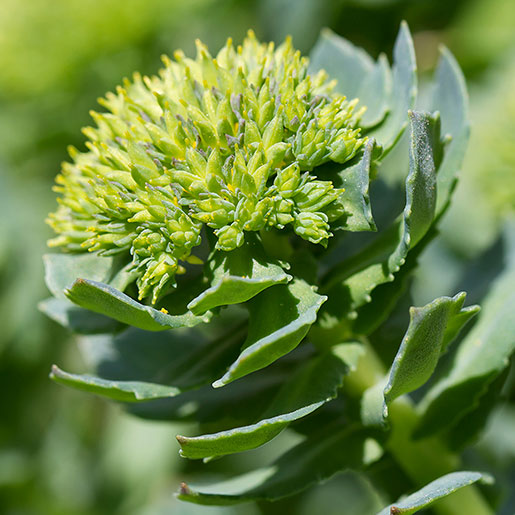Rhodiola

Common Names: arctic root, golden root, rose root, rosenroot, king's crown
Latin Names: Rhodiola rosea
Background
- Rhodiola grows in cold regions and at high altitudes in Europe, Asia, and North America.
- Rhodiola has a long history of use in Russia, Scandinavia, and other parts of Europe. Traditionally, rhodiola was used for work performance, endurance, fatigue, depression, and altitude sickness.
- Today, rhodiola is promoted for improving athletic performance, mood, and cognition; increasing energy; and reducing stress.
How Much Do We Know?
- There isn’t enough reliable evidence to determine whether rhodiola or its components are useful for any health-related purpose. Most of the research in people is of low-to-moderate quality.
What Have We Learned?
- We haven’t learned enough to say whether rhodiola is useful for any health-related purpose.
What Do We Know About Safety?
- Rhodiola is possibly safe for up to 12 weeks. Side effects may include dizziness, headache, insomnia, and either dry mouth or excessive saliva production.
- Interactions between rhodiola and losartan (a drug used for high blood pressure) have been reported.
- Little is known about whether it’s safe to use rhodiola during pregnancy or while breastfeeding.
Keep in Mind
- Depression can be a serious illness. If you or someone in your family may have depression, consult a health care provider.
- Take charge of your health—talk with your health care providers about any complementary health approaches you use. Together, you can make shared, well-informed decisions.
- If you take any type of medicine, talk with your health care provider before using any herbal product; some herbs and medicines interact in harmful ways.
- Federal Regulation of Herbal Products
- Depending on what’s in them, how they’re intended to be used, and how they’re administered (orally or topically), herbal products are regulated in a variety of ways. Many herbal products intended for oral use are marketed as dietary supplements. The regulatory paths for making and distributing dietary supplements are different than those for drugs.
- Unlike drugs, dietary supplements are not approved by the U.S. Food and Drug Administration (FDA) before they are sold to the public. When public health concerns arise about the safety of a dietary supplement or an ingredient including an herb, the FDA can take action to protect the public. Manufacturers and distributors of supplements are responsible for evaluating the safety and labeling of their products before marketing to ensure that they meet all regulatory requirements.
NCCIH Clearinghouse
The NCCIH Clearinghouse provides information on NCCIH and complementary and integrative health approaches, including publications and searches of Federal databases of scientific and medical literature. The Clearinghouse does not provide medical advice, treatment recommendations, or referrals to practitioners.
Toll-free in the U.S.: 1-888-644-6226
Telecommunications relay service (TRS): 7-1-1
Website: https://www.nccih.nih.gov
Email: info@nccih.nih.gov (link sends email)
PubMed®
A service of the National Library of Medicine, PubMed® contains publication information and (in most cases) brief summaries of articles from scientific and medical journals. For guidance from NCCIH on using PubMed, see How To Find Information About Complementary Health Practices on PubMed.
Website: https://pubmed.ncbi.nlm.nih.gov/
Office of Dietary Supplements (ODS), National Institutes of Health (NIH)
ODS seeks to strengthen knowledge and understanding of dietary supplements by evaluating scientific information, supporting research, sharing research results, and educating the public. Its resources include publications (such as Dietary Supplements: What You Need To Know) and fact sheets on a variety of specific supplement ingredients and products (such as vitamin D and multivitamin/mineral supplements).
Website: https://ods.od.nih.gov
Email: ods@nih.gov (link sends email)
Key References
- Ballmann CG, Maze SB, Wells AC, et al. Effects of short-term Rhodiola rosea (golden root extract) supplementation on anaerobic exercise performance. Journal of Sports Sciences. 2019;37(9):998-1003.
- Crawford C, Boyd C, Deuster PA. Dietary supplement ingredients for optimizing cognitive performance among healthy adults: a systematic review. Journal of Alternative and Complementary Medicine. 2021;27(11):940-958.
- Gao L, Wu C, Liao Y, et al. Antidepressants effects of rhodiola capsule combined with sertraline for major depressive disorder: a randomized double-blind placebo-controlled clinical trial. Journal of Affective Disorders. 2020;265:99-103.
- Lopresti AL, Smith SJ, Drummond PD. Modulation of the hypothalamic-pituitary-adrenal (HPA) axis by plants and phytonutrients: a systematic review of human trials. Nutritional Neuroscience. 2022;25(8):1704-1730.
- Rhodiola. NatMed Pro website. Accessed at naturalmedicines.therapeuticresearch.com on November 1, 2024. [Database subscription].
- Sanz-Barrio PM, Noreen EE, Gilsanz-Estebaranz L, et al. Rhodiola rosea supplementation on sports performance: a systematic review of randomized controlled trials. Phytotherapy Research. 2023;37(10):4414-4428.
- Sarris J, Ravindran A, Yatham LN, et al. Clinician guidelines for the treatment of psychiatric disorders with nutraceuticals and phytoceuticals: The World Federation of Societies of Biological Psychiatry (WFSBP) and Canadian Network for Mood and Anxiety Treatments (CANMAT) Taskforce. World Journal of Biological Psychiatry. 2022;23(6):424-455.
- Tao H, Wu X, Cao J, et al. Rhodiola species: a comprehensive review of traditional use, phytochemistry, pharmacology, toxicity, and clinical study. Medical Research Reviews. 2019;39(5):1779-1850.
- Williams TD, Langley HN, Roberson CC, et al. Effects of short-term golden root extract (Rhodiola rosea) supplementation on resistance exercise performance. International Journal of Environmental Research and Public Health. 2021;18(13):6953.
This publication is not copyrighted and is in the public domain. Duplication is encouraged.
NCCIH has provided this material for your information. It is not intended to substitute for the medical expertise and advice of your health care provider(s). We encourage you to discuss any decisions about treatment or care with your health care provider. The mention of any product, service, or therapy is not an endorsement by NCCIH.